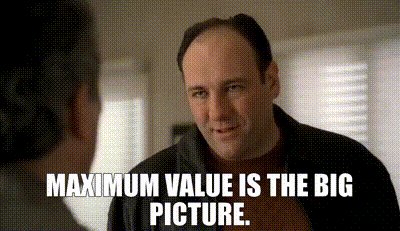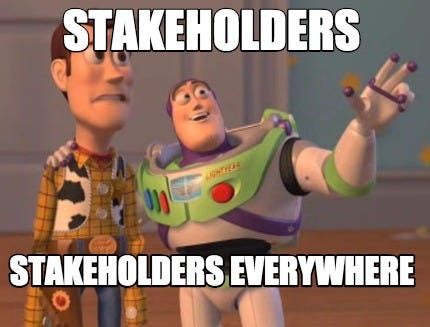How do you "add value"?
"At the earliest drawings of the fractal curve, few clues to the underlying mathematical structure will be seen" - Ian Malcolm
How are you “adding value” to your organisation?
Many professionals face this question in some form from time to time. Whether asked by someone else, or through self-reflection. For some roles, direct and quantifiable measures can easily be found. A sales professional can confidently say, “I won 4 new clients this month" or “I brought in £2M in revenue this quarter”. A support representative can say “I resolved 45 client issues this week”. A recruiter can say “I’ve filled 25 roles this month”.
Nonetheless, thinking about value can be more complex and so more challenging for others whose contribution is indirect or more qualitative - consultants, designers, and leadership roles of various kinds all have some quantitative measures through which their performance can be assessed. However, often these roles are more generalist, where their impact is the result of a creative combination of elements of sales and persuasion skills, finance, marketing, operations or technology (and that contribution may be highly unique).
I’ve always tried to contribute to the teams I work with by focusing on “creating value” over the long term. Those around me perceive this in different ways - I’ve heard some people refer to this as me demonstrating “commercial acumen”, others as showing a product or client-focused “mindset” or even having an “entrepreneurial spark”.
Regardless of the words used, to me this is all about understanding how value is created. What are the things that are valuable to be doing or creating?
Having a background as a technologist, people I talk with are sometimes surprised by this as the vast majority of technology roles don’t explicitly have any responsibility for commercial matters. I’d perhaps go as far as saying that many people in those roles don’t want it. However, my curiosity about how the systems I work within generate value over time has helped me align my efforts with broader strategic objectives, make informed decisions, and - I believe - so far at least - resulted in better personal, professional, and career development opportunities for myself and those I work with.
So, what is “value”?
When considering “value” many people immediately leap to those financial measures - income, profit, hours billed, monthly subscriptions - and this is attractive for many reasons. Profit and loss statements, management accounts and balance sheets are easily understood, analysed, shared and compared.
Nevertheless, a business (or any other organisation) produces many other positive outcomes - not only financial ones.
If we can produce these outcomes for our broader set of stakeholders, we are arguably still creating value and whilst some of these “values” are hard to quantify or measure (or in some cases impossible or impractical) I’d argue that these dimensions are often the real drivers behind sustainability in the long run. These more qualitative aspects also give us a more balanced view of an organisations performance than financial metrics alone. (Unless of course you’re Mr. Krabs here who only cares about money)
If someone asked why you bought your last car, you are highly unlikely to reply from a financial perspective. “It delivers a preferable means of transport at an acceptable price to me and also yields a reasonable profit for the manufacturer.” Car buyers, whilst obviously having to operate within their financial constraints, place far more value on other things - long term reliability, efficiency, comfort - even the “character” or colour of a car over the raw price or cost efficiency that it delivers.
Thinking about my own role if asked why I work for Hymans Robertson I could give the Profit and Loss account answer... “Hymans have met my reserve price for work and so I exchange my efforts with them for money.” This is as true for me as for anyone gainfully employed. However, that doesn’t represent what I really value.
I value the work I do as interesting and important to our clients. I value that the people I work with sharing my own personal values of being friendly, curious, honest, hardworking and having a purpose beyond themselves as individuals. I value a workplace that supports learning, work-life-balance and is friendly and inclusive.
Thinking more widely about our firm’s stakeholders…
Our clients value our high-quality advice and best-in-class service and we strive to create and deliver services that are both highly professional and responsive.
Our own team value our unique culture where everyone feels valued and respected, and we can offer real opportunities for personal and professional development and career growth.
Our suppliers value our collaborative approach and that helps us build and maintain strong, mutually beneficial partnerships over time.
Our regulators and auditors value our meticulous record-keeping and high communication standards - demonstrating that we clearly adhere to legal regulations and maintain high ethical standards.
And last and by no means least, the community we operate in shares our values of social responsibility, environmental sustainability and volunteering and having a positive impact beyond our firms boundaries. (I’m personally very proud of our B-Corp status.)
This gives us a much richer picture of the value that Hymans adds as a firm.
However, this broader view of value and how these individual elements trade-off against each other is a complex blend. When viewed in the round, they describe well the uniqueness that our stakeholders value but they also defy the simple comparisons that financial statements give us, making them harder to standardise and compare.
So how can we optimise this complex web of value, and make sure that we as both individuals and organisations are focusing on the “right” blend? How can we ensure that we are continually creating value for our stakeholder groups without either:-
Overly supporting any one of them (to the detriment of others) or;
Trying too hard to satisfy everyone and in doing so dilute our efforts so thinly we lose focus and so don’t have any impact at all?
It’s a tricky balancing act that many of us deal with.
And… there are two thing making this balancing act extra tricky. Firstly, that that balance changes over time (whether by the second or century) and secondly - the dynamic balancing of many factors means there is no singular correct answer.
As you might expect from someone with a systems background - I believe there is no simple formula for success here. We need to take - yes - you guessed it - a systematic approach (or more accurately - approaches) to successfully navigate this particularly complex puzzle.
Hence the title of this series… “Value Creation Systems.”
In this series, I’ll discuss some of these systems-based approaches to creating value for you, your team, your organisation, and beyond.
But before we get to that, first things first. In my next few posts, I’ll discuss what “systems” actually are - particularly those dynamic, non-linear and chaotic systems (the category of systems that organisations fall in to) and then discuss what that means for all of us working within them.
Whether you're just starting learning about systems-thinking or you’re looking to refine your systems knowledge and skills… By reflecting on my own thoughts and experience, I hope this will help you answer the exam question “How are you adding value?”- and think about things from a different perspective, perhaps giving you some confidence to try a different approach.
You can go ahead and subscribe below to get notified when I post.
See you next time when I’ll introduce the idea of “processes” as one of the foundational elements of systems-thinking, but in the meantime, thanks for reading!
Footnote: It’s also worth noting that value changes over time. Whilst not explicitly designed for the purpose, the marshmallow test serves as an interesting illustration of how people trade off the dilemma of immediate vs. delayed value.





